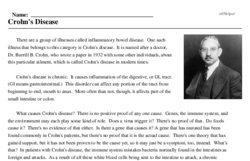Crohn's Disease
There are a group of illnesses called inflammatory bowel disease. One such illness that belongs to this category is Crohn's disease. It is named after a doctor, Dr. Burrill B. Crohn, who wrote a paper in 1932 with some other individuals, about this particular ailment, which is called Crohn's disease in modern times.
Crohn's disease is chronic. It causes inflammation of the digestive, or GI, tract. (GI means gastrointestinal.) This disorder can affect any portion of the tract from beginning to end, mouth to anus. More often than not, though, it affects part of the small intestine or colon.
What causes Crohn's disease? There is no positive proof of any one cause. Genes, the immune system, and the environment may each play some kind of role. Does a virus trigger it? There's no proof of that. Do foods cause it? There's no evidence of that either. Is there a gene that causes it? A gene that has mutated has been found commonly in Crohn's patients, but there's no proof that it is the actual cause. There's one theory that has gained support, but it has not been proven to be the cause yet, so it may just be a symptom, too, instead. What's that? In patients with Crohn's disease, the immune system mistakes bacteria normally found in the intestines as foreign and attacks. As a result of all these white blood cells being sent to the intestine to attack, a chronic inflammation develops. Over time, ulcerations and injury occur. Symptoms of Crohn's disease form.
There are actually five kinds of Crohn's disease - ileocolitis, ileitis, gastroduodenal Crohn's disease, jejunoileitis, and Crohn's colitis. Each is classified based on the location most clearly affected by Crohn's disease. Ileocolitis is the most common.
What are the symptoms of Crohn's disease? Persistent diarrhea and abdominal pain are. There can be a fever. Sometimes there's rectal bleeding which can be serious enough to lead to anemia. Loss of appetite can be present in some cases. Tears can develop in the lining of the anus which can bleed and be painful. Some of these symptoms are mild; some of these symptoms are severe. In general, patients experience times which are flare-ups, and other periods of time when the disease is in remission so symptoms are not present. In addition, a skin rash, liver inflammation, arthritis, eye inflammation, kidney stones, and clotting problems are associated with Crohn's disease. Children with this disorder often have growth problems.




